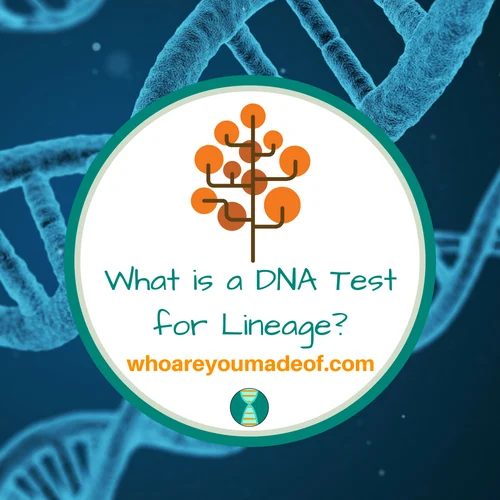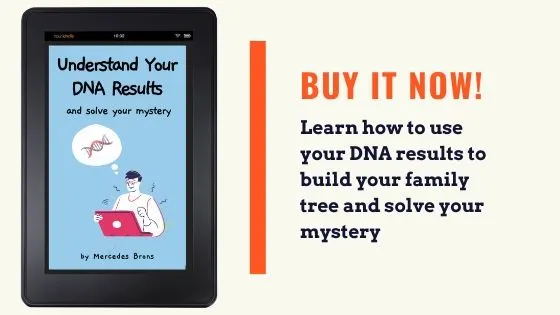What is a DNA test for lineage? How does it work? What can a DNA test tell you, exactly? In this post, I'll answer all of these questions and more.
If you are anything like most people, you probably have lots of friends who have tried doing a DNA test to learn about their heritage. Do you have questions about this type of DNA test?

I became interested in doing a DNA test to "learn my lineage" too. Specifically, I realized that I didn't really know much about all of my great-grandparents, and I knew even less about most of my great-great grandparents.
Would a DNA test be able to tell me where all of my great-grandparent and great-great grandparents were born? Could it tell me if I had Native American and Jewish ancestry, like the family rumors suggested?
Some types of DNA tests don't help you learn much about your lineage
There are a few different types of DNA tests. Y DNA tests can test your paternal line going back thousands of years. mtDNA does the same thing, but on your maternal side.
What I mean by a maternal or a paternal line is the mother of your mother of your mother (etc...) or the father of your father of your father (etc...). This type of information is great, and can be helpful for certain things, but by only testing these two lines, you only get information on 1-2% of all of your ancestors.
What's more is that women can't take a Y DNA test. So if you are a man, you can learn about 1-2% of your ancestors because you can take both the Y-DNA and the mtDNA test.
If you are a woman, you could only take the mtDNA test and learn about less than 1% of your total ancestors. This is not very helpful for really understanding where we come from.
What if there was a way to learn about 100% of your relatively recent ancestors and many of your more distant ancestors on both sides of your family? As in, what if there was a way that you could learn about more than just your purely maternal or purely paternal lines?
Guess what? There is a unique type of DNA test that has been growing in popularity. It is known as an autosomal DNA test. it's affordable, both men and women can take it, and the amount and type of information that can be revealed is absolutely incredible.
Yes, there is such a thing as a DNA test for lineage - it's called an autosomal DNA test
Whereas the Y-DNA tests test the Y chromosome (which only men have) and the mtDNA test tests the mitochondrial DNA (which both men and women have), the autosomal DNA test analyzes DNA contained in the "autosomes" - any of the numbered chromosomes.
The value of the information contained in the autosomal DNA is a relatively recent discovery, but DNA testing companies were quick to realize that this information would be useful to those of us who are interested in genealogy, lineage, and family history.
You and I inherited our autosomal DNA from both of our parents, and they got theirs from their parents, and their parents got theirs from your great-grandparents, and your great-grandparents got theirs from their great-great grandparents - and so on, and so on, and so on.
This means that contained within your autosomal DNA are segments of DNA that were passed down from your recent, distant, and in many cases, very distant, ancestors. You inherited autosomal DNA from both your mother and father, as well as all four of your grandparents, regardless of whether you are biologically male or female.
How does the DNA test for lineage work?
DNA testing companies are able to compare your autosomal DNA segments, which you inherited from your recent and distant ancestors on both sides of your family, with DNA segments of other DNA testing customers and reference panels to provide you with an ethnicity estimate and a list of DNA matches.
Most people take an interest in DNA testing in order to access their ethnicity estimate. An ethnicity estimate is based on the autosomal DNA that we inherited from our parents.
It is important to mention that we didn't inherit 100% of our parent's DNA. We only inherited 50% of each of their DNA, and they only inherited 50% from their parents, and so on and so on. What this means is that we will share DNA with all of our more recent ancestors, and many of our more distant ancestors.
The autosomal ethnicity estimate is, as such, a "snapshot" into our family's ancestry. At this point in time, it is the absolute best that modern science has to offer us. Since we don't share DNA with every single ancestor, there is obviously going to be a certain amount of information that an autosomal DNA test can't reveal.
Even with this important limitation, an autosomal DNA test can tell us information about our ancestry going back as far as 500 years, and sometimes even a little further than that. This is much further back than most people have built their family tree, and I consider this to be a very valuable tool in learning about lineage.
Just as the DNA segments can be used to identify your ethnic heritage, DNA segments can also be used to identify living relatives. We share substantial amounts of DNA with close relatives, smaller amounts with our closer cousins, and less with distant cousins.
Technologically advanced software can find segments in your DNA that match the segments belonging to other DNA test takers who tested with the same DNA testing company. You will generally receive a list of DNA matches beginning with the closest relative first, and going down in the order of distance in their relationship to you.
You'll be able to contact these relatives if you wish, which is often an excellent way to learn more about your family's history.
Which is the best DNA test for lineage?
There are several companies offering very good autosomal DNA testing services:
- Ancestry DNA
- My Heritage DNA
- Family Tree DNA
- 23 and Me
- Living DNA
All of the companies offer a similar service with a similar quality, and so if you already have a preferred company, you won't go wrong (as long as it is on that list above). I do have a recommended company, however, especially if you are seriously about getting a good return on investment on your foray into DNA testing.
I recommend testing with Ancestry DNA or 23andMe for the following reasons:
- These companies have the biggest commercial database of DNA testers, meaning you'll get more and closer DNA matches at Ancestry or 23andMe than you will anywhere else
- It's exceptionally easy to build a family tree on Ancestry, and 23andMe has a built-in family tree feature that organizes your matches
- On Ancestry, You can connect your family tree to your DNA results to gain more insight into your family's lineage
- 23andMe and Ancestry have the most comprehensive and accurate ethnicity estimates in the industry
No matter which company you choose to test with, I feel pretty confident that you'll discover something interesting about your family's ancestry.
You can order a DNA test using any of the links below. I may receive a very small commission that helps me support this site, and it is at no extra cost to you, so thank you!
Conclusion
I hope that this post helped you understand what a DNA test for lineage is, why an autosomal test is the best test for learning about your ancestry, how the test works, and which one I recommend.
If you have any questions, comments, or concerns about something that you read in this post, I would love to hear from you in the comments below.
Thanks for stopping by today!


Jane Torma
Sunday 8th of November 2020
Hi, I have tested with both Ancestry and 23 & Me. How can their results be so different? I know they keep changing as they get more samples, but for example, I was raised with my Swiss grandfather. 23 & Me have identified my Swiss genetics and even determined correctly which Canton Grandfather was from. But Ancestry has not, at all! Both companies have quite different results, with 23 & Me being correct to my know ancestry and Ancestry, which has my family tree, not?